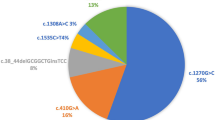Abstract
Biotinidase deficiency is an inherited metabolic disorder characterized by inability to recycle protein-bound biotin. It usually presents with ataxia and seizures, though atypical presentations have also been described. We report a 15-month-old boy with profound biotinidase deficiency who presented with laryngeal stridor and subsequently developed severe ataxia and lactic acidosis. Subsequently, it was discovered that the patient’s newborn screening test for biotinidase activity had been inconclusive, but confirmatory testing had not been done. Brain magnetic resonance imaging showed multiple white matter non-enhancing T2 hyperintensities, which largely resolved following 6 months of biotin therapy; however, there was residual deafness and mental retardation. Conclusion:An argument is made for universal newborn screening in biotinidase deficiency and improved mechanisms for follow-up of positive screens, because delay in diagnosis results in irreversible morbidity, newborn screening is cost effective, and early therapy prevents the neurologic sequelae.

Similar content being viewed by others
References
Ataman M, Sozeri B, Ozalp I (1992) Biotinidase deficiency: a rare cause of laryngeal stridor. Int J Pediatr Otorhinol 23: 218–284
Baumgartner ER, Suormala TM, Wick H, Probst A, Blauenstein U, Bachmann C, Vest M (1989) Biotinidase deficiency: a cause of subacute necrotizing encephalomyelopathy (Leigh syndrome). Report of a case with lethal outcome. Pediatr Res 26: 260–266
Bousounis D, Camfield P, Wolf B (1993) Reversal of brain atrophy with biotin treatment in biotinidase deficiency. Neuropediatrics 24: 214–217
Dunkel G, Scriver C, Clow C, Melancon S, Lemieux B, Grenier A, Laberge C (1989) Prospective ascertainment of complete and partial serum biotinidase deficiency in the newborn. J Inherit Metab Dis 12: 131–138
Haagerup A, Anderson J, Blichfeldt S, Christensen M (1997) Biotinidase deficiency: two cases of very early presentation. Develop Med Child Neurol 39: 832–835
Pomponio R, Reynolds T, Cole H, Buck G, Wolf B (1995) Mutational hotspot in the human biotinidase gene causes profound biotinidase deficiency. Nat Genet 11: 96–98
Taitz L, Green A, Strachan I, Bartlett K, Bennet M (1983) Biotinidase deficiency and the eye and ear. Lancet 2: 918
Tokatli A, Coskun T, Ozalp I, Gunay M (1992) The major presenting symptom in a biotinidase-deficient patient: laryngeal stridor. J Inherit Metab Dis 15: 281–282
Vici CD, Bachmann C, Graziani MC,Sabella G (1988) Laryngeal stridor as a leading symptom in a biotinidase-deficient patient. J Inherit Metab Dis 11: 312–313
Wastell H, Dale G, Bartlett K (1984) A sensitive fluorimetric rate assay for biotinidase using new derivative of biotin, biotinyl-6-aminoquinoline. Anal Biochem 140: 69–73
Wolf B (1991) Worldwide survey of neonatal screening for biotinidase deficiency. J Inherit Metab Dis 14: 923–237
Wolf B (2001) Disorders of biotin metabolism. In: Scriver C, Beaudet A, Sly W Valle D (eds) The metabolic and molecular Basies of inherited disease. McGraw-Hill, New York, pp 3935
Wolf B, Grier R Heard G (1983) Hearing loss in biotinidase deficiency. Lancet 2: 1365–1366
Acknowledgements
The authors thank Dr. Paige Kaplan and Dr. Michael Bennett for critical reading of the manuscript.
Author information
Authors and Affiliations
Corresponding author
Rights and permissions
About this article
Cite this article
Hoffman, T.L., Simon, E.M. & Ficicioglu, C. Biotinidase deficiency: the importance of adequate follow-up for an inconclusive newborn screening result. Eur J Pediatr 164, 298–301 (2005). https://doi.org/10.1007/s00431-005-1629-8
Received:
Accepted:
Published:
Issue Date:
DOI: https://doi.org/10.1007/s00431-005-1629-8




